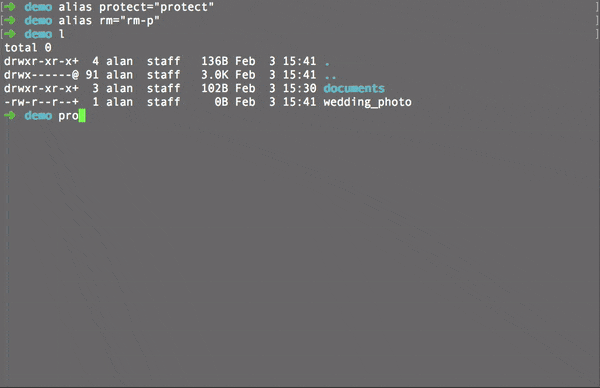https://github.com/alanzchen/rm-protection
A safe alternative for "rm".
https://github.com/alanzchen/rm-protection
filesystem linux macos python rm unix utility
Last synced: about 1 month ago
JSON representation
A safe alternative for "rm".
- Host: GitHub
- URL: https://github.com/alanzchen/rm-protection
- Owner: alanzchen
- License: mit
- Created: 2017-02-03T07:07:03.000Z (almost 9 years ago)
- Default Branch: master
- Last Pushed: 2018-11-10T01:20:53.000Z (about 7 years ago)
- Last Synced: 2025-03-14T04:22:25.810Z (11 months ago)
- Topics: filesystem, linux, macos, python, rm, unix, utility
- Language: Python
- Size: 20.5 KB
- Stars: 419
- Watchers: 19
- Forks: 34
- Open Issues: 0
-
Metadata Files:
- Readme: README.md
- License: LICENSE
Awesome Lists containing this project
README

# rm-protection
     [](https://pepy.tech/project/rm-protection)
A safe alternative for `rm` with minimum difference
Ports: See [#ports](#ports)
Wiki: https://github.com/alanzchen/rm-protection/wiki
# What is this?
`rm-protection` is a safe alternative for removing files. It works exactly the same as `rm` (in fact it passes arguments to `rm` almost untouched). The only difference is that it refuses to proceed if a `.*.rm-protection` file is found and you failed to answer a question.
# Why are you here?
I watched GitLab engineers trying to recover their production database live on YouTube.
Suddenly an idea struck me: What if `rm` prompted to ask "Which server are you on?" or "Which database are you trying to delete?"?

The disaster could have been avoided.
# Quick Start
1. Install from PyPi and make an alias for `rm-p` .
`pip install rm-protection` and optionally, `alias rm="rm-p"` for your daily user and **root** (so that it works for `sudo`).
2. Protect your files using `protect`. If you want to protect everything inside, `protect -R`.
3. Happy rm-ing!
# How does it work?
It consists of two utilities: `rm-p` and `protect`. The latter one is to help you protect files.
For example, you have a file called `important_file` and it is `protect`ed by `.important_file.rm-protection`. `rm-p` will recognize that `important_file` is protected and prompt to ask you a question stored in `.important_file.rm-protection`. `rm-p` will only proceed if you get the answer right.
See it in action:

It will also prevent you from deleting a directory with `protect`ed file(s) inside.

# Requirements
- Python 2 or 3
- Linux, unix and macOS
- `find`
# Comparison with alternative methods
| Methods | Can be used as "rm"? | Protect Specific Files | Flexibility | Additional Files |
| ---------------------------------------- | -------------------- | ---------------------- | ----------- | ------------------ |
| [trash-cli](https://github.com/sindresorhus/trash-cli) | Yes | Somehow | High | Centralised Config |
| rm -i | Yes | No or Somehow | High | |
| [safe-rm](https://launchpad.net/safe-rm) | Yes | Yes | Low | Centralized Config |
| rm-protection | Yes | Yes | High | One for each |
# Why don't you just use XXX?
`rm-protection` aims at providing maximum protection and flexibility while making minimum impact on daily operation.
`rm -i` can be very annoying, `trash-cli` is a bit complex (imagine you have a habit of emptying the trash without a second thought, or imagine you are trying to free up spaces on a budget vm). ` Safe-rm` is inconvenient when you really need to delete something (you have to edit the configuration file).
Instead, `rm-protection` asks you a question set by you. You are fully covered when removing files (you won't accidentally empty the trash with `trash-cli` or `| yes` with `rm -i`), and you can quickly remove files (without editing any configuration files).
# How to contribute?
Pull requests and issues are all welcome! Or tell others about this, so you can even `protect` the files you send to others!
Actually I don't care if people are using my implementation at all. I just think this kind of mechanism can be great -- using a `.rm-protection` file that asks questions.
If the community welcomes this mechanism, it will soon be ported/rewritten in every platform or languages, or even be implemented in the GNU coreutils. Then you can even get some default protections shipped with distributions and packages.
**So if you agree on this mechanism, please share with others!**
# Ports
## C
- [rm-protection-c](https://github.com/losfair/rm-protection-c)
`rm-protection` implemented in C by [losfair](https://github.com/losfair/)
Current only offers binaries for Linux, source code available for building in macOS and unix.
(Note that it may behave slightly differently from `rm-protection` and it has not been tested by me.)